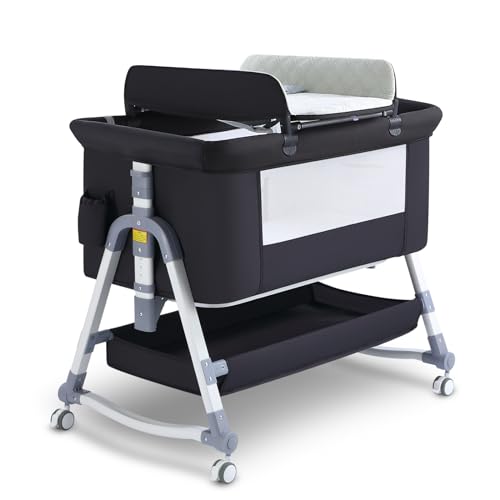You'll Never Guess This Bedside Cosleeper's Tricks
페이지 정보

본문
Bedside Cosleeper
 A bedside cosleeper is a bassinet that connects to the side of your adult bed. It's safe, so long as you adhere to the CSPC safety guidelines for infant sleep spaces.
A bedside cosleeper is a bassinet that connects to the side of your adult bed. It's safe, so long as you adhere to the CSPC safety guidelines for infant sleep spaces.
These guidelines are similar in many ways to crib bedding standards. You can learn more about these guidelines here. The most important aspects to consider when selecting the best bedside sleeper are Safety, Comfort, and Convenience.
Safety
Many new parents and expecting mothers have adopted cosleeping or bed-sharing, in line with the American Academy of Pediatrics recommendation that infants should be in the same room as their parents. The Academy states that room-sharing with a baby is more secure than sleeping in the same bed as parents because it lowers the risk of Sudden Unexpected Infant Death (SIDS). While the AAP does not recommend bed sharing, it does recommend that co-sleeping be done on a separate sleep surface to reduce the risk of SIDS. This is why the development of the Bedside cosleeper (Timeoftheworld.Date) was so crucial for many families.
A bedside cosleeper is a similar to a crib sleeper that can be attached to an adult bed frame. The bedside cosleeper helps parents monitor the baby and allows the baby the ability to sleep in their own bed. The best cosleepers are built with high-quality materials and meet strict safety standards. Look for the Juvenile Products Manufacturers Association (JPMA) stamp of approval, which confirms rigorous testing of the product and quality control to ensure your child's safe cosleeping experience.
The security of a cosleeper for the bed depends on several factors that include the way it is set up and secured to the parent's bed. If the bedside cosleeper isn't attached to the parent's bed in a way that blocks the gaps and spaces where an infant could be trapped, it could be an hazard of suffocation. It is essential that the attachment system of the large bedside crib sleeper is examined to make sure that it can withstand any forces that are imposed to it during use, like the parent bouncing on and off the sleeper. The attachment system or the corners on the bedside cosleeper must be tested against a horizontal force.
The standard for newborn bedside cot sleeping cribs is based on to the federal consumer product safety standards for bassinets (16 CFR part 1218), including performance requirements for fabric-sided closed openings. The standard's mandatory requirements also tackle the issue of neck and head entrapment by requiring that, after the application, release 50 lbs. horizontal force in the vicinity of the attachment systems and at the corners of the bedside sleeping device, an opening larger than 1.0 in. It is not allowed to create a gap greater than 1.0 in. Only read-only copies of the standard can be found at ASTM's online Reading Room.
Convenience
Many parents have resisted cosleeping due to fear of suffocation, SIDS or the "Ferberization" process that forces children to sleep on their own, anthropologists have long noted that mammals and primates and people in non-Western societies, regularly cosleep. This is because babies are soothed when they hear their mother's voice. They can also learn to self-soothe.
The best bedside sleepers have clever designs that are attached to the sides of any mattress and can swivel so that you can access it easily for diaper changes or feedings during the middle of the night. Look for one with feet that can be adjusted to retract to accommodate different mattress sizes, and a big storage compartment to store all of your baby's necessities.
Choose a bedside sleeper which fits the standard crib bedding so that it can be used safely as your child grows. Consider a model that is convertible and can be used as a play area or a bassinet that is deeper. It can last for many years.
Portability
Depending on the size of your bedroom a bedside sleeping system with wheels and/or a light base could be more convenient to move around the house than one with a heavy wood frame or substantial base. The babybay bedside sleeping system, HALO bassiNest essencetia and Snoo Smart Sleeper are all portable. They have adjustable feet that retract to accommodate platforms and legs that fold inwards to provide maximum access to the mattress; 100 mesh sidewalls that allow ventilation without covering the baby's nose or mouth.
 The Arm's Reach ClearVue is a great option. It adjusts in 1" increments and can be used as a bassinet, or a portable bed. It also swivels to allow quick access to the baby so that you can soothe her, feed her, or check on them at night.
The Arm's Reach ClearVue is a great option. It adjusts in 1" increments and can be used as a bassinet, or a portable bed. It also swivels to allow quick access to the baby so that you can soothe her, feed her, or check on them at night.
 A bedside cosleeper is a bassinet that connects to the side of your adult bed. It's safe, so long as you adhere to the CSPC safety guidelines for infant sleep spaces.
A bedside cosleeper is a bassinet that connects to the side of your adult bed. It's safe, so long as you adhere to the CSPC safety guidelines for infant sleep spaces.These guidelines are similar in many ways to crib bedding standards. You can learn more about these guidelines here. The most important aspects to consider when selecting the best bedside sleeper are Safety, Comfort, and Convenience.
Safety
Many new parents and expecting mothers have adopted cosleeping or bed-sharing, in line with the American Academy of Pediatrics recommendation that infants should be in the same room as their parents. The Academy states that room-sharing with a baby is more secure than sleeping in the same bed as parents because it lowers the risk of Sudden Unexpected Infant Death (SIDS). While the AAP does not recommend bed sharing, it does recommend that co-sleeping be done on a separate sleep surface to reduce the risk of SIDS. This is why the development of the Bedside cosleeper (Timeoftheworld.Date) was so crucial for many families.
A bedside cosleeper is a similar to a crib sleeper that can be attached to an adult bed frame. The bedside cosleeper helps parents monitor the baby and allows the baby the ability to sleep in their own bed. The best cosleepers are built with high-quality materials and meet strict safety standards. Look for the Juvenile Products Manufacturers Association (JPMA) stamp of approval, which confirms rigorous testing of the product and quality control to ensure your child's safe cosleeping experience.
The security of a cosleeper for the bed depends on several factors that include the way it is set up and secured to the parent's bed. If the bedside cosleeper isn't attached to the parent's bed in a way that blocks the gaps and spaces where an infant could be trapped, it could be an hazard of suffocation. It is essential that the attachment system of the large bedside crib sleeper is examined to make sure that it can withstand any forces that are imposed to it during use, like the parent bouncing on and off the sleeper. The attachment system or the corners on the bedside cosleeper must be tested against a horizontal force.
The standard for newborn bedside cot sleeping cribs is based on to the federal consumer product safety standards for bassinets (16 CFR part 1218), including performance requirements for fabric-sided closed openings. The standard's mandatory requirements also tackle the issue of neck and head entrapment by requiring that, after the application, release 50 lbs. horizontal force in the vicinity of the attachment systems and at the corners of the bedside sleeping device, an opening larger than 1.0 in. It is not allowed to create a gap greater than 1.0 in. Only read-only copies of the standard can be found at ASTM's online Reading Room.
Convenience
Many parents have resisted cosleeping due to fear of suffocation, SIDS or the "Ferberization" process that forces children to sleep on their own, anthropologists have long noted that mammals and primates and people in non-Western societies, regularly cosleep. This is because babies are soothed when they hear their mother's voice. They can also learn to self-soothe.
The best bedside sleepers have clever designs that are attached to the sides of any mattress and can swivel so that you can access it easily for diaper changes or feedings during the middle of the night. Look for one with feet that can be adjusted to retract to accommodate different mattress sizes, and a big storage compartment to store all of your baby's necessities.
Choose a bedside sleeper which fits the standard crib bedding so that it can be used safely as your child grows. Consider a model that is convertible and can be used as a play area or a bassinet that is deeper. It can last for many years.
Portability
Depending on the size of your bedroom a bedside sleeping system with wheels and/or a light base could be more convenient to move around the house than one with a heavy wood frame or substantial base. The babybay bedside sleeping system, HALO bassiNest essencetia and Snoo Smart Sleeper are all portable. They have adjustable feet that retract to accommodate platforms and legs that fold inwards to provide maximum access to the mattress; 100 mesh sidewalls that allow ventilation without covering the baby's nose or mouth.
 The Arm's Reach ClearVue is a great option. It adjusts in 1" increments and can be used as a bassinet, or a portable bed. It also swivels to allow quick access to the baby so that you can soothe her, feed her, or check on them at night.
The Arm's Reach ClearVue is a great option. It adjusts in 1" increments and can be used as a bassinet, or a portable bed. It also swivels to allow quick access to the baby so that you can soothe her, feed her, or check on them at night.- 이전글Is Tech Making Coffee Machine For Beans Better Or Worse? 25.01.05
- 다음글Beware: 10 Out Errors 25.01.05
댓글목록
등록된 댓글이 없습니다.



